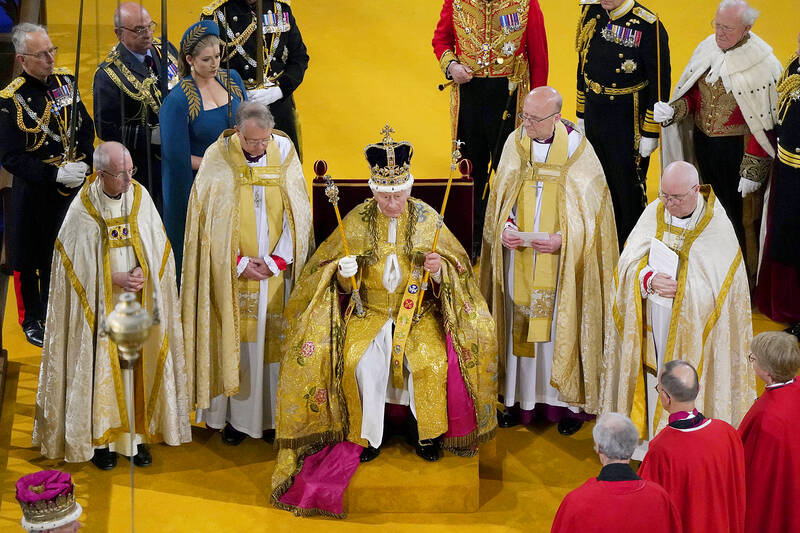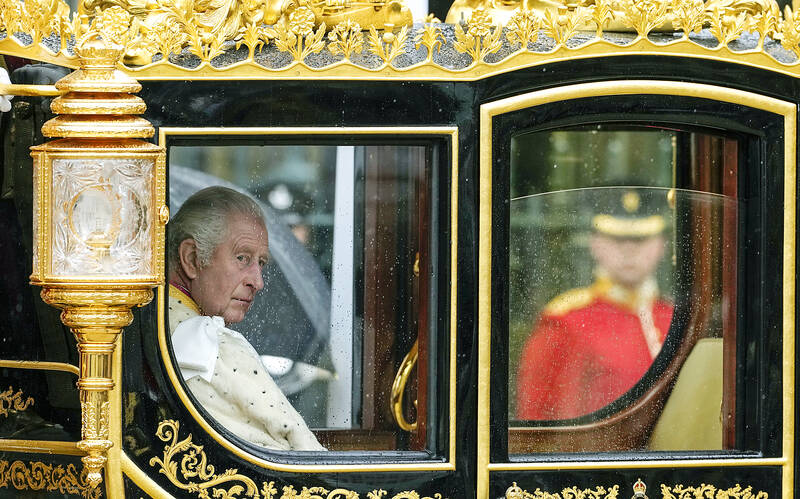Charles III was crowned king yesterday in a solemn Christian ceremony steeped in 1,000 years of history and tradition, but adapted to reflect 21st-century Britain.
St Edward’s Crown — a solid gold, sacred symbol of the monarch’s authority used only once in their reign — was placed on Charles’ head at 11am to cries of “God Save the King.”
Trumpet fanfares sounded through London’s Westminster Abbey and ceremonial gun salutes blasted out across land and sea to mark the first coronation of a British monarch since 1953 — and only the fifth since 1838.

Photo: AP
King Charles and his wife, Camilla, who was crowned queen, returned to Buckingham Palace in the rarely used horse-drawn gold state coach past huge crowds, before watching a ceremonial fly-past from the balcony.
The coronation — only the second to be televised, and the first in color — was the religious confirmation of Charles’ accession.
Charles, 74, has been king since the death of his mother, Queen Elizabeth II, in September last year after seven decades as her heir apparent.

Photo: AP
Much of the two-hour Anglican service, led by Archbishop of Canterbury Justin Welby, would be recognizable to the 39 other monarchs crowned at Westminster Abbey since 1066.
While many of the intricate rituals and ceremony to recognize Charles as his people’s “undoubted king” remain, he has sought to bring other aspects of the service up to date.
There were female bishops for the first time, while leaders of Britain’s non-Christian faiths and its Celtic languages played a prominent role.
As king, Charles is supreme governor of the Church of England, but heads a more religiously and ethnically diverse country than the one his mother inherited in the shadow of World War II.
He has also sought to make the 2,300-strong congregation more reflective of British society, inviting ordinary members of the public to sit alongside heads of state and global royalty.
In another change, the coronation themes mirror his lifelong interest in biodiversity and sustainability.
Seasonal flowers and foliage filled the abbey, selected from the wind-battered Isle of Skye in northwest Scotland to Cornwall at the tip of England’s southwest coast.
Single-use plastic and floral foam were banned, and all the flowers are to be donated to charities helping the elderly and vulnerable. Ceremonial vestments from previous coronations were reused, and the anointing oil was vegan.
British Prime Minister Rishi Sunak described the coronation as “a proud expression of our history, culture and traditions.”
The “moment of extraordinary national pride,” he said, was “a vivid demonstration of the modern character of our country and a cherished ritual through which a new era is born.”
However, not everyone is convinced. Polling shows waning support for the monarchy, particularly among younger people, with calls for it to be modernized or even scrapped altogether.
Republicans who want an elected head of state have promised to protest, holding up placards stating: “Not my king.”
Overseas, Charles’ time as the hereditary monarch and head of state of 14 Commonwealth countries looks increasingly fragile.
Jamaica and Belize this week signalled that they are moving toward becoming republics, while Australians often talk of the same.
Britons struggling with the soaring cost of living have meanwhile questioned why taxpayers should pay for the coronation, with the bill estimated to be more than £100 million (US$126.39 million).
Yet the huge crowds of royal fans that have been building all week on The Mall outside Buckingham Palace indicate that the royals still have a central role in British culture and history.
Many of those camping out to watch have flown in from abroad, underlining the royal family’s untouched position as the UK’s leading global brand.
The coronation is the centrepiece of three days of events, including a concert at Windsor Castle west of London tonight.
“It’s so exciting,” said charity worker Karen Chamberlain, 57, who has camped out for a prime spot with her sister and young son.
“None of us have ever lived a coronation. Our mother came to London in 1953. Being here is a way to say we are proud of the monarchy,” she said.

A car bomb killed a senior Russian general in southern Moscow yesterday morning, the latest high-profile army figure to be blown up in a blast that came just hours after Russian and Ukrainian delegates held separate talks in Miami on a plan to end the war. Kyiv has not commented on the incident, but Russian investigators said they were probing whether the blast was “linked” to “Ukrainian special forces.” The attack was similar to other assassinations of generals and pro-war figures that have either been claimed, or are widely believed to have been orchestrated, by Ukraine. Russian Lieutenant General Fanil Sarvarov, 56, head

SAFETY FIRST: Double the number of police were deployed at the Taipei Marathon, while other cities released plans to bolster public event safety Authorities across Taiwan have stepped up security measures ahead of Christmas and New Year events, following a knife and smoke bomb attack in Taipei on Friday that left four people dead and 11 injured. In a bid to prevent potential copycat incidents, police deployments have been expanded for large gatherings, transport hubs, and other crowded public spaces, according to official statements from police and city authorities. Taipei Mayor Chiang Wan-an (蔣萬安) said the city has “comprehensively raised security readiness” in crowded areas, increased police deployments with armed officers, and intensified patrols during weekends and nighttime hours. For large-scale events, security checkpoints and explosives

PUBLIC SAFETY: The premier said that security would be tightened in transport hubs, while President Lai commended the public for their bravery The government is to deploy more police, including rapid response units, in crowded public areas to ensure a swift response to any threats, President William Lai (賴清德) said yesterday after a knife attack killed three people and injured 11 in Taipei the previous day. Lai made the remarks following a briefing by the National Police Agency on the progress of the investigation, saying that the attack underscored the importance of cooperation in public security between the central and local governments. The attack unfolded in the early evening on Friday around Taipei Main Station’s M7 exit and later near the Taipei MRT’s Zhongshan

REBUFFED: In response to Chinese criticism over recent arms sales, Washington urged Beijing to engage in meaningful dialogue instead of threats and intimidation Washington’s long-term commitment to Taiwan would not change, the US Department of State said yesterday, urging Beijing to stop pressuring Taiwan and engage in meaningful bilateral dialogues. The remarks came in response to a backlash from Beijing about Washington’s latest approval of arms sales to Taiwan. The US Defense Security Cooperation Agency said in a statement on Wednesday that the Taipei Economic and Cultural Representative Office in the US has asked to purchase an arms package, including Tactical Mission Network Software; AH-1W helicopter spare and repair parts; M109A7 self-propelled howitzers; HIMARS long range precision strike systems; tube-launched, optically tracked, wire-guided missiles; Javelin